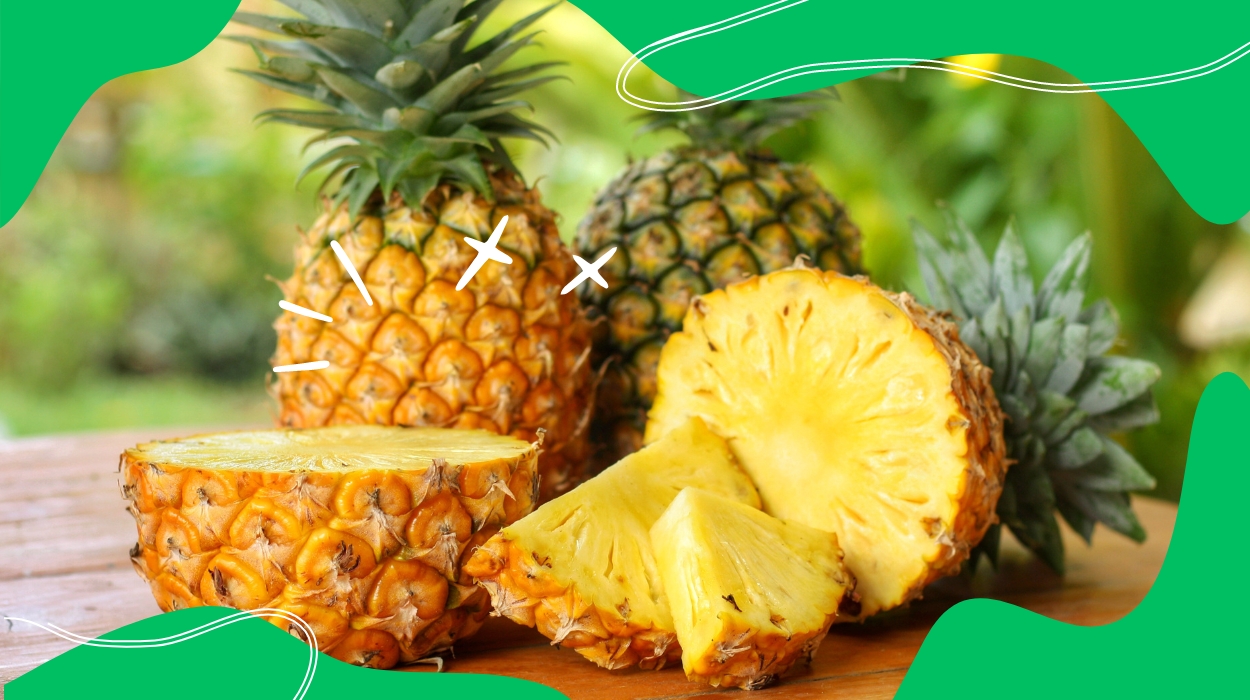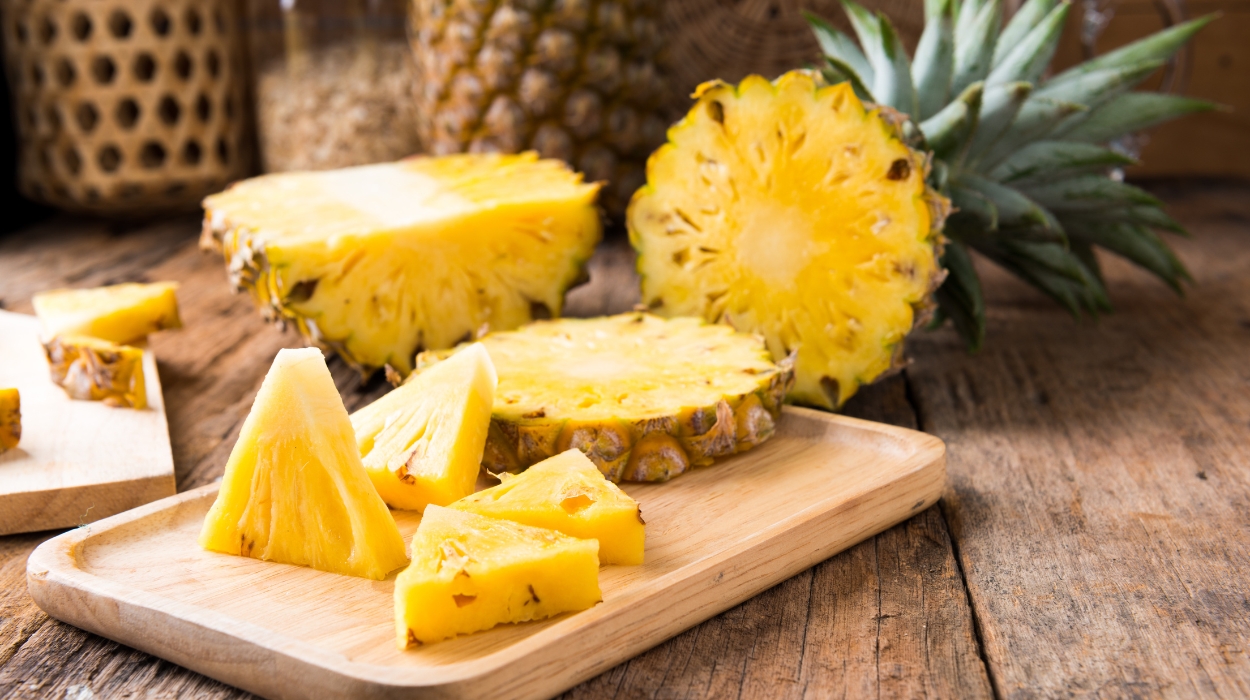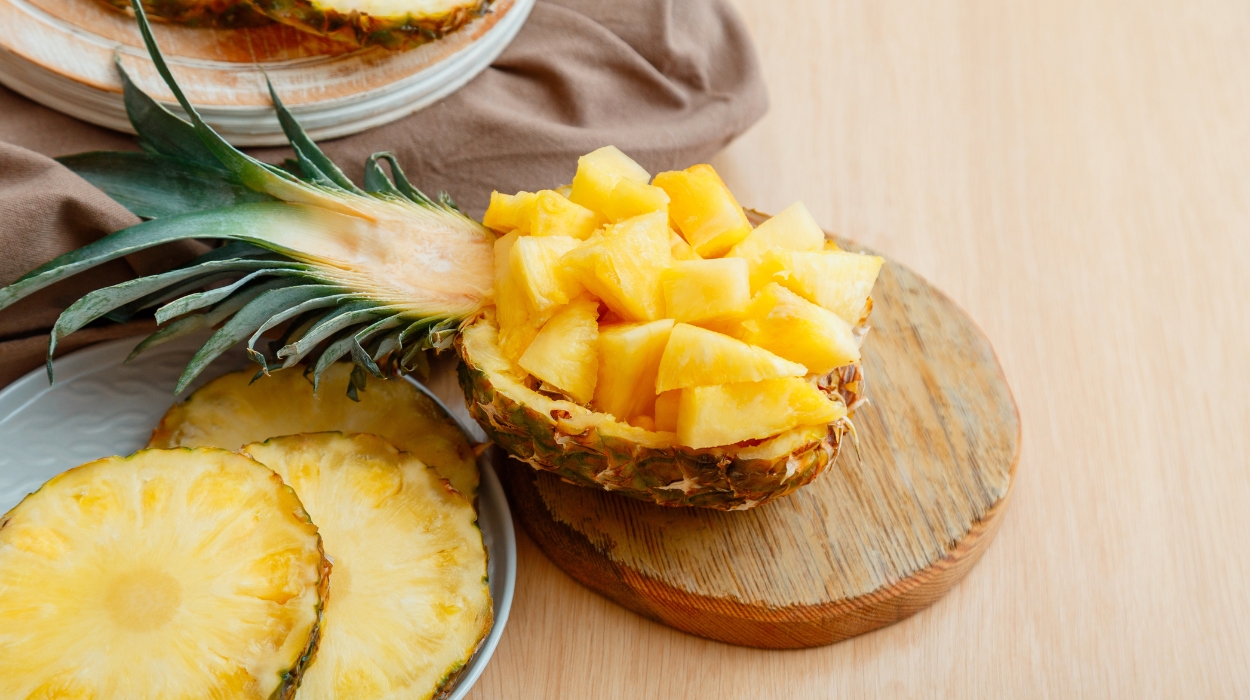 Expert's opinion
Expert's opinion
Expert's opinion
The article is a subjective view on this topic written by writers specializing in medical writing.
It may reflect on a personal journey surrounding struggles with an illness or medical condition, involve product comparisons, diet considerations, or other health-related opinions.
Although the view is entirely that of the writer, it is based on academic experiences and scientific research they have conducted; it is fact-checked by a team of degreed medical experts, and validated by sources attached to the article.
The numbers in parenthesis (1,2,3) will take you to clickable links to related scientific papers.
Is Pineapple Good For Weight Loss? Benefits Of Low-Calorie Fruit 2024

Many weight loss plans include plenty of fruits since they’re high in nutrients and relatively low in calories. Pineapple is a popular, delicious fruit touted for its sweet, tangy flavor and impressive nutrition profile.
This tasty tropical fruit has long had a reputation for promoting weight loss and inspired a 1970s fad diet that recommended eating large quantities of pineapple for weight loss while drastically restricting other foods. Single-food diets often are nutritionally deficient and can have health consequences.[1]
Modern versions of the pineapple diet typically aren’t as strict, but may still lack variety. There are some variations promoting a pineapple juice diet focused on drinking fresh juice. Ideally, pineapple is consumed in moderation as part of a balanced diet. But is pineapple good for weight loss?
Is Pineapple Good For Weight Loss?
Most experts recommend increasing your intake of fruits and vegetables during weight loss attempts since they’re nutrient-dense, meaning they contain a high amount of essential nutrients for the calories consumed. Fruit, including pineapple, may help you lose weight if it replaces more calorie-dense foods. Pineapple makes a sweet treat that’s full of nutrition but relatively low in calories.
Pineapple Nutrition Profile
Is pineapple a good addition to your diet plan? A one-cup serving of cut-up pineapple (165 g) has only about 83 calories[2] while providing over two grams of fiber and plenty of fluids.
Pineapple’s fiber content may help with weight loss by promoting satiety and preventing overeating. Some studies[3] have associated higher fiber intake with more weight loss.
Pineapple is also a juicy fruit, containing up to 86% water.[2] Consuming healthy foods high in water can benefit hydration, critical when losing weight since thirst is often mistaken for hunger. Some research has linked higher fluid intake with more weight loss.[4]
Polyphenols
Pineapples are a good source of polyphenols, which are plant compounds with antioxidant effects. Lab research has found that the polyphenols in pineapple and other fruits may block the enzymes[5] that break down fats and carbohydrates, hindering their absorption and thereby leading to the absorption of fewer calories.
Studies[6] in rats found that feeding them pineapple reduced the negative impact of high-fat and high-cholesterol diets[7] on their body weight, body fat, and cholesterol levels, possibly due to polyphenol compounds decreasing fat storage. It’s unclear how these compounds affect weight status in people.
Health Benefits Of Pineapple

Can eating pineapple benefit your overall health? Experts recommend a high fruit and vegetable intake, not only for achieving a healthy weight but also for the prevention[5] of multiple chronic diseases and improved longevity. The perks of pineapple go beyond its low-calorie content; other benefits include its high nutrient and antioxidant content.
Nutrients and Antioxidants
Pineapple is an excellent source of the antioxidant vitamin C,[8] essential for immunity and the health of skin and other body tissues, and manganese,[2] necessary for maintaining strong bones. It also provides a variety of other nutrients, including the minerals potassium, iron, and calcium, along with other trace minerals and B vitamins.
Other health benefits of pineapple include its high antioxidant[5] activity. In addition to the antioxidant vitamin C, pineapple’s multiple polyphenol compounds, including catechin, epicatechin, gallic acid, ferulic acid, and luteolin,[5] offer antioxidant effects linked to a lower risk of numerous chronic diseases.
Additionally, pineapple is a source of dietary fiber. Research indicates that a high fiber intake[9] may lead to a healthier gut microbiome, a lower risk for digestive problems, improved blood sugar control,[10] and a lower risk of chronic disease, including heart disease and certain types of cancer.[10] Pineapple’s fiber content paired with its high water content promotes intestinal regularity.
Bromelain
Pineapple also contains an enzyme called bromelain. Bromelain[11] has demonstrated anti-inflammatory properties and antibacterial, anti-viral,[12] and anti-cancer effects.[13]
Some studies using bromelain supplements have found additional health benefits, including a reduced risk of blood clots,[14] reduced pain and inflammation in people post-surgery[15] and in people with arthritis,[14] and enhanced healing of injuries[15] and wounds.[16]
Although eating pineapple likely won’t have the same impact since the amount of bromelain is much lower than that of supplements, the bromelain in pineapple may still offer health benefits.
Health Effects
Research is ongoing on the health benefits of pineapple or its components. Pineapple has a long history of use for digestive ailments.[17] Other studies have focused on immunity and heart health.
- Digestive health: In addition to its fiber content, the bromelain in pineapple promotes proper digestion since it contains proteases,[13] enzymes that help break down protein into amino acids. Bromelain has also shown anti-inflammatory effects[18] in the gastrointestinal tract. Since most studies have been in labs or in animals, more research is needed to confirm whether these effects also occur in people.
- Immunity: A study[19] of schoolchildren in the Phillippines found that eating two cans of pineapple per day improved their immune health, possibly linked to increased vitamin C levels, and lowered their incidence of common infections. Because some children were malnourished, it’s unclear whether the effects would be the same in a well-nourished person. Other studies have also found that bromelain may positively affect immunity.[11]
- Heart health: Research has found that pineapple lowers cholesterol[20] and reduces cardiac inflammation in rats, possibly due to its multiple polyphenols.[7] Further studies are needed to see if these effects translate into benefits for heart health in people.
Potential Side Effects

Pineapple offers plenty of health perks, but there are some potential downsides. Some people may be unable to eat pineapple due to allergies or other considerations.
Possible side effects include:
Allergies
Some people need to avoid pineapple entirely due to an allergy[12] to the fruit itself or to its enzyme bromelain. Allergic reactions to pineapple or other foods can be severe and may include difficulty breathing.
Irritation
Eating large amounts of pineapple can irritate[21] the mouth and digestive tract due to its content of acids and bromelain. The acidity of pineapple can also damage tooth enamel.
Sugar Intake
Pineapple contains a significant amount of natural sugar, about 16 grams per one-cup serving, although its fiber content will help slow down sugar absorption. However, if you’re watching your blood sugar level, it’s best to monitor your portion sizes and avoid pineapple products with added sugar.
Best Ways To Eat Pineapple For Weight Loss
Increasing your intake of healthy produce like pineapple may help you on your weight loss journey. There are many ways to include this delicious summer fruit in your diet.
Choosing Pineapple
You can purchase whole or pre-cut fresh pineapple, though availability may vary based on the time of year. You can also find pineapple chunks frozen, canned, or dried; these options may be easier to find and prepare.
While frozen unsweetened pineapple has a similar nutrition profile to fresh, further processing can reduce levels of the water-soluble vitamin C; canned pineapple has significantly less vitamin C[22] and dried pineapple has even lower levels.
If you go for canned, frozen, or dried pineapple, check labels and avoid brands with added sugar. If you’re watching your calorie intake, be aware that dried pineapple contains more calories, 120 for a ½-cup serving.
Will pineapple juice also help you lose weight? You can buy the juice or make your own with a juicer. However, pineapple juice is not particularly good to promote weight loss due to its lack of fiber and higher sugar and calorie content per one-cup serving.[23] You can limit excess calories by avoiding added sugar and watching your portions if you choose to drink juice.
Preparing Pineapple
If you choose a whole fruit, look for a golden yellow color and a slightly soft (but not mushy or bruised) fruit. After removing the leaves, peel, and core, you can cut them into delectable slices or chunks.
Pineapple makes a nutritious and refreshing snack. Consume pineapple for weight loss with a protein source like nuts, yogurt, cottage cheese, or a wedge of cheese for added satiety.
To incorporate pineapple into meals, try adding it to green or fruit salads or grilling it on kabobs or as part of other savory recipes. You can also blend fresh or frozen pineapple into smoothies for a tasty treat; to limit calories, keep an eye on portion sizes and avoid adding sugar.
Summary
Pineapple is a delicious and popular tropical fruit that’s relatively low in calories. It can be purchased and prepared in various ways. Like other fruits, pineapple fits into a balanced diet. Along with other healthful lifestyle modifications, it may help you tackle weight gain and reduce belly fat due to its nutrient density, fiber, fluid, and polyphenol content.
In addition to its potential benefits for weight loss, preliminary research has indicated that the benefits of pineapple and its components may include effects on the immune system, digestive health, and heart health.
+ 23 sources
Health Canal avoids using tertiary references. We have strict sourcing guidelines and rely on peer-reviewed studies, academic researches from medical associations and institutions. To ensure the accuracy of articles in Health Canal, you can read more about the editorial process here
- Tahreem, A., Allah Rakha, Roshina Rabail, Nazir, A., Socol, C., C. Maerescu and Rana Muhammad Aadil (2022). Fad Diets: Facts and Fiction. [online] 9. doi:https://doi.org/10.3389/fnut.2022.960922.
- Usda.gov. (2023). FoodData Central. [online] Available at: https://fdc.nal.usda.gov/fdc-app.html#/food-details/169124/nutrients.
- Barber, T.M., Kopf, S., Pfeiffer, A. and Weickert, M.O. (2020). The Health Benefits of Dietary Fibre. [online] 12(10), pp.3209–3209. doi:https://doi.org/10.3390/nu12103209.
- Thornton, S.N. (2016). Increased Hydration Can Be Associated with Weight Loss. [online] 3. doi:https://doi.org/10.3389/fnut.2016.00018.
- Piya Temviriyanukul, Suwapat Kittibunchakul, Piyapat Trisonthi, Woorawee Inthachat, Dalad Siriwan and Uthaiwan Suttisansanee (2021). Analysis of Phytonutrients, Anti-Mutagenic and Chemopreventive Effects of Tropical Fruit Extracts. [online] 10(11), pp.2600–2600. doi:https://doi.org/10.3390/foods10112600.
- El-Shazly, S.A., Ahmed, M.H., AL-Harbi, M.S., Alkafafy, M., El-Sawy, H.B. and Sayed (2018). Physiological and molecular study on the anti-obesity effects of pineapple (Ananas comosus) juice in male Wistar rat. [online] 27(5), pp.1429–1438. doi:https://doi.org/10.1007/s10068-018-0378-1.
- Porrnthanate Seenak, Sarawut Kumphune, Wachirawadee Malakul, Ratanon Chotima and Nitirut Nernpermpisooth (2021). Pineapple consumption reduced cardiac oxidative stress and inflammation in high cholesterol diet-fed rats. [online] 18(1). doi:https://doi.org/10.1186/s12986-021-00566-z.
- Nih.gov. (2020). Office of Dietary Supplements – Vitamin C. [online] Available at: https://ods.od.nih.gov/factsheets/vitaminC-HealthProfessional/.
- Barber, T.M., Kopf, S., Pfeiffer, A. and Weickert, M.O. (2020). The Health Benefits of Dietary Fibre. [online] 12(10), pp.3209–3209. doi:https://doi.org/10.3390/nu12103209.
- Corina-Bianca Ioniță-Mîndrican, Khaled Ziani, Mititelu, M., Oprea, E., Sorin Neacșu, Moroșan, E., Dumitrescu, D.-E., Andra Cătălina Roșca, Doina Drăgănescu and Negrei, C. (2022). Therapeutic Benefits and Dietary Restrictions of Fiber Intake: A State of the Art Review. [online] 14(13), pp.2641–2641. doi:https://doi.org/10.3390/nu14132641.
- Vidhya Rathnavelu, Noorjahan Banu Alitheen, S. Sohila, Samikannu Kanagesan and Ramesh, R. (2016). Potential role of bromelain in clinical and therapeutic applications. [online] 5(3), pp.283–288. doi:https://doi.org/10.3892/br.2016.720.
- Paweł Hikisz and Bernasinska-Slomczewska, J. (2021). Beneficial Properties of Bromelain. [online] 13(12), pp.4313–4313. doi:https://doi.org/10.3390/nu13124313.
- Manzoor, Z., Nawaz, A., Mukhtar, H. and Ikram ul Haq (2016). Bromelain: Methods of Extraction, Purification and Therapeutic Applications. [online] ResearchGate. Available at: https://www.researchgate.net/publication/301923082_Bromelain_Methods_of_Extraction_Purification_and_Therapeutic_Applications.
- Pavan, R., Jain, S., Shraddha and Kumar, A. (2012). Properties and Therapeutic Application of Bromelain: A Review. [online] 2012, pp.1–6. doi:https://doi.org/10.1155/2012/976203.
- Muhammad ZA;Ahmad T (2017). Therapeutic uses of pineapple-extracted bromelain in surgical care – A review. JPMA. The Journal of the Pakistan Medical Association, [online] 67(1). Available at: https://pubmed.ncbi.nlm.nih.gov/28065968/.
- Chakraborty, A., Mitra, S., Trina Ekawati Tallei, Abu Montakim Tareq, Firzan Nainu, Donatella Cicia, Kuldeep Dhama, Talha Bin Emran, Simal-Gandara, J. and Capasso, R. (2021). Bromelain a Potential Bioactive Compound: A Comprehensive Overview from a Pharmacological Perspective. [online] 11(4), pp.317–317. doi:https://doi.org/10.3390/life11040317.
- NCCIH (2020). Bromelain. [online] NCCIH. Available at: https://www.nccih.nih.gov/health/bromelain.
- Dinarello, C.A. (2010). Anti-inflammatory Agents: Present and Future. [online] 140(6), pp.935–950. doi:https://doi.org/10.1016/j.cell.2010.02.043.
- Mavil May Cervo, Llido, L.O., Barrios, E.B. and Panlasigui, L.N. (2014). Effects of Canned Pineapple Consumption on Nutritional Status, Immunomodulation, and Physical Health of Selected School Children. [online] 2014, pp.1–9. doi:https://doi.org/10.1155/2014/861659.
- Noor Atiqah Zuraini, Sekar, M., Wu, Y., Siew Hua Gan, Srinivasa Reddy Bonam, Nur, Begum, M., Pei Teng Lum, Vetriselvan Subramaniyan, Neeraj Kumar Fuloria and Shivkanya Fuloria (2021). Promising Nutritional Fruits Against Cardiovascular Diseases: An Overview of Experimental Evidence and Understanding Their Mechanisms of Action. [online] Volume 17, pp.739–769. doi:https://doi.org/10.2147/vhrm.s328096.
- Md. Farid Hossain (2015). Nutritional Value and Medicinal Benefits of Pineapple. [online] 4(1), pp.84–84. doi:https://doi.org/10.11648/j.ijnfs.20150401.22.
- Usda.gov. (2023). FoodData Central. [online] Available at: https://fdc.nal.usda.gov/fdc-app.html#/food-details/169127/nutrients.
- Usda.gov. (2023). FoodData Central. [online] Available at: https://fdc.nal.usda.gov/fdc-app.html#/food-details/168187/nutrients.



